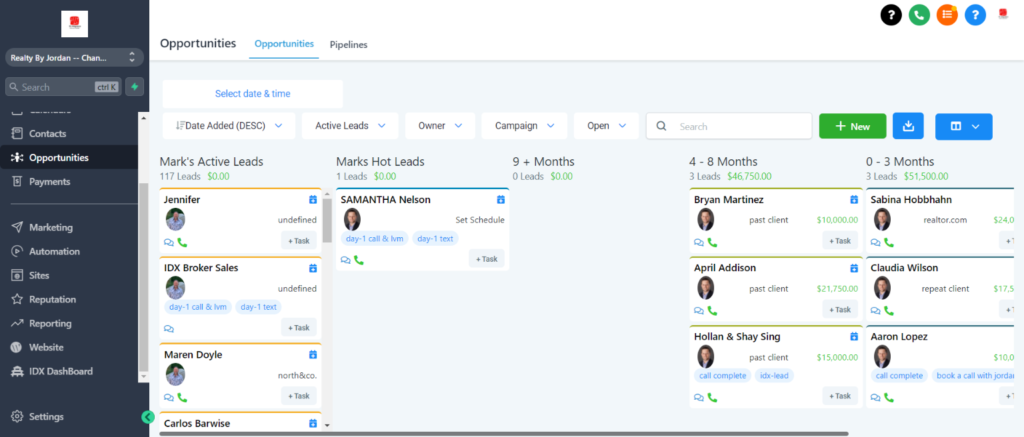Customer Relationship Management (CRM) systems have become indispensable for businesses in today’s competitive market. They provide a centralized platform to manage and analyze customer interactions and data, ultimately improving customer experience and driving growth. By implementing a CRM system, businesses enjoy numerous advantages that can significantly impact their bottom line.
One major advantage of a CRM is the ability to store customer information in one accessible place, allowing various departments to collaborate more efficiently and deliver a consistent customer-centric experience.
By centralizing data, CRMs enable businesses to keep track of prospect communications, preferences, and sales history, informing sales, marketing, and support teams to devise better strategies and enhance customer relationships.
Automation is another critical benefit offered by CRM systems. They can automate everyday tasks, such as data entry, reminders for follow-up activities, and sales processes, ensuring that no opportunities are missed and time is used more efficiently. This results in increased productivity and allows companies to focus on cultivating stronger customer relationships and, ultimately, increasing revenue.
What Is a CRM?
A Customer Relationship Management (CRM) system is a set of integrated, data-driven software solutions that help businesses manage, track, and store information about their current and potential customers.
By utilizing a CRM, companies can centralize this information, granting their teams seamless access to essential customer insights when they need them the most (Microsoft Dynamics 365).
CRM platforms maintain historical customer data and facilitate improved customer experiences by connecting departments and streamlining data sharing across teams. This is often recognizable through increased business efficiency, better customer retention rates, and higher sales (Salesforce).
Some of the core functionalities of a CRM include:
- Contact management
- Lead tracking and nurturing
- Sales and marketing automation
- Customer support features
- Analytics and reporting
- Integration with other business applications
CRMs cater to various industries, from small businesses to large organizations, enabling them to improve their customer-centric approach and more efficiently manage customer relationships (Forbes Advisor).
Improved Customer Relationships
Customer relationship management (CRM) systems offer numerous advantages for businesses by streamlining their interactions with customers.
This section will discuss how CRMs lead to improved customer relationships through personalization, timely communication, and customer segmentation.

Personalization
CRMs enable businesses to understand their customers better and tailor their interactions accordingly. When customer information is centralized and organized within a CRM, companies can access details about customers’ preferences, past purchases, and engagement with marketing materials.
This knowledge enables companies to provide personalized experiences, fostering customer trust and loyalty. According to Anthill, personalization at scale is one of the most significant CRM benefits for improving team efficiency.
Timely Communication
Effective and timely communication plays a crucial role in maintaining strong customer relationships. CRM systems enable businesses to manage and track customer communication, ensuring messages are sent at the right time and to the right people.
Additionally, CRMs can automate the follow-up process, so businesses can stay connected with customers consistently while reducing the workload of sales and customer service teams.

Customer Segmentation
CRM systems also provide businesses with valuable data to segment customers based on various factors such as demographics, purchase behavior, and engagement levels.
This segmentation allows businesses to create targeted marketing campaigns that resonate with specific customer groups, leading to better conversion rates and overall customer satisfaction. By understanding the distinctions among customer segments, businesses can address their unique needs and preferences more effectively, contributing to enhanced customer relationships.
Increased Sales
Lead Management
One significant advantage of using a CRM system is its efficient management of leads. CRM systems help businesses in collecting, organize, and prioritize potential customers. This streamlines the sales process, resulting in a higher lead conversion rate and ultimately increased sales.
Sales Forecasting
CRM systems also contribute to accurate sales forecasting, essential for business growth. A CRM can identify trends and patterns by analyzing past sales data, enabling sales teams to make informed decisions and plan for future sales scenarios. This helps businesses allocate resources effectively and capitalize on potential sales opportunities.
Cross-selling and Upselling
CRM systems provide sales teams with comprehensive customer data, allowing them to identify opportunities for cross-selling and upselling. Cross-selling involves offering related products or services to a customer while upselling persuades a customer to purchase a higher-priced item or upgrade. With a better understanding of customer needs and preferences, sales teams can tailor their offerings and pitch, increasing sales and revenue.
Despite being brief, the information provided in this section highlights how CRM systems can lead to increased sales through efficient lead management, accurate sales forecasting, and effective cross-selling and upselling strategies.
Enhanced Communication and Collaboration
One significant advantage of using a CRM system is its enhanced communication and collaboration among team members. By centralizing and organizing customer information and interactions, CRM platforms allow team members to access and share important data to improve overall customer experience and streamline business processes.
Team Visibility
A CRM system promotes team visibility by providing a unified view of customer information and interactions. This enables team members to stay informed about active leads, customer touchpoints, and ongoing tasks, ensuring a more coordinated approach to customer relationship management. As a result, sales, marketing, and support teams are better aligned, leading to quicker response times and improved customer satisfaction (source).

Document Sharing
Document sharing is another essential aspect of enhanced communication and collaboration a CRM system provides. With shared file repositories and integration with popular cloud services, CRM platforms enable team members to easily access, manage, and share documents related to customer interactions, projects, and processes. This ensures all relevant information is readily available to team members when needed, reducing delays and promoting an organized workflow (source).
To summarize, a CRM system offers enhanced communication and collaboration features, crucial for team success in managing and improving customer relationships. By providing easy access to customer information, improving visibility, and promoting seamless document sharing, CRM platforms significantly contribute to streamlined processes, effective teamwork, and, ultimately, a better customer experience.
Efficient Business Processes
Implementing a CRM system can lead to more efficient processes and improved productivity. This section discusses the various ways CRM fosters efficient business operations through task automation, centralized data, and performance insights.
Task Automation
One key advantage of using a CRM system is automating various tasks, saving time, and allowing employees to focus on more important responsibilities. Tasks that can be automated include data entry, follow-up reminders, and even sending out targeted marketing materials to customers (HubSpot). By automating these routine tasks, employees can concentrate on fostering better client relationships and pursuing new business opportunities.
Centralized Data
A CRM system consolidates all the customer data and interactions in one centralized database, making it easy for employees to access crucial information at any time (Salesforce).
This centralized information helps businesses avoid duplicate communication and conflicting information, ensuring a consistent and seamless experience for employees and customers. Furthermore, having centralized data enables various departments to collaborate more effectively and streamline internal communication.
Performance Insights
CRM systems provide valuable insights into a business’s overall performance by using customer data to identify trends and areas of improvement (Business News Daily). Companies can leverage these insights to refine their sales strategies and optimize their marketing efforts.
Additionally, management can monitor the performance of individual sales representatives and use this information to make informed decisions in areas such as training and promotions.
A CRM system is a powerful tool for promoting efficient business processes. Companies that utilize CRM software can benefit from task automation, centralized data, and performance insights, leading to a more productive and well-coordinated workforce.
Scalability and Customization
One of the significant advantages of a CRM system is its scalability and customization. These two features allow businesses to adapt them to fit their needs, making them even more valuable.
Adaptable Solutions
CRM systems can be customized and scaled to accommodate the needs of growing businesses. Small companies can start with a simpler, more affordable software version and gradually expand its features as their business grows. Larger organizations can utilize the same CRM platform to meet the demands of their customer base, no matter how many employees or customers they have. This means a CRM system can be a cost-effective solution for businesses of any size, thanks to its scalability and flexibility.
Integrations with Other Tools
Another advantage of CRM systems is their ability to integrate with other business applications. This allows companies to streamline their operations and improve efficiency, as they can connect sales, marketing, and customer service initiatives.
CRM software can be easily connected to various tools, such as email services, marketing automation software, and more, making it a versatile addition to any organization’s technology stack.
For example, CRM systems can link to marketing automation software, allowing organizations to track marketing campaigns better, create targeted messages, and monitor the effectiveness of advertisements. These integrations help businesses streamline their workflows, making it easier to manage customer relationships and ultimately improving the overall customer experience.
Scalability and customization are critical factors in choosing a CRM solution, ensuring that the software will grow with the company and adapt to its ever-changing needs. Organizations can better manage customer relationships by investing in a system that offers adaptable solutions and seamless integrations with other tools. CRM is an essential component of every successful business strategy.
Conclusion
In the rapidly evolving business landscape, adopting a CRM system offers many benefits for companies looking to improve customer relationships, streamline operations, and drive growth. From enhanced communication to valuable data insights, CRM platforms have become indispensable tools for businesses of all sizes.
One critical advantage of CRM systems is their ability to centralize customer information, making it readily accessible to employees across the organization. This simplified collaboration enables teams to understand customers’ needs and preferences better, leading to more tailored offerings and higher customer satisfaction levels (Salesforce.com).
Moreover, CRM platforms can improve sales efficiency by automating routine tasks, tracking leads, and providing insights into customer behaviors. This increases conversion rates and helps businesses stay competitive (Forbes Advisor).
By incorporating CRM software into their daily operations, companies can better analyze data to identify trends and opportunities for improvement. This allows businesses to fine-tune their product offerings and create targeted marketing campaigns that resonate with their customers, further driving revenue growth (Business News Daily).
Ultimately, investing in a CRM solution benefits not only individual team members but also the organization as a whole. Its diverse and versatile advantages make CRM an essential asset for businesses that strive for excellence in customer relations and sustainable growth.


